Legal teams play an important role in taking business operations to completion. Companies rely on legal teams to provide key input in most activities ranging from hiring talent to building strategic channels and partnerships, and closing sales.
With a variety of important tasks that depend on them, legal teams can't afford to delay business operations due to poor utilization of resources or slow management of legal requests. Delayed contracts, NDAs, or MOUs can bring down elaborate business plans and result in lost renewal revenue, lawsuits, and inefficient sales cycles.
By adopting a unified service management platform, legal teams can build an effective process that helps them keep pace with the rest of the business.
Common challenges that plague legal teams:
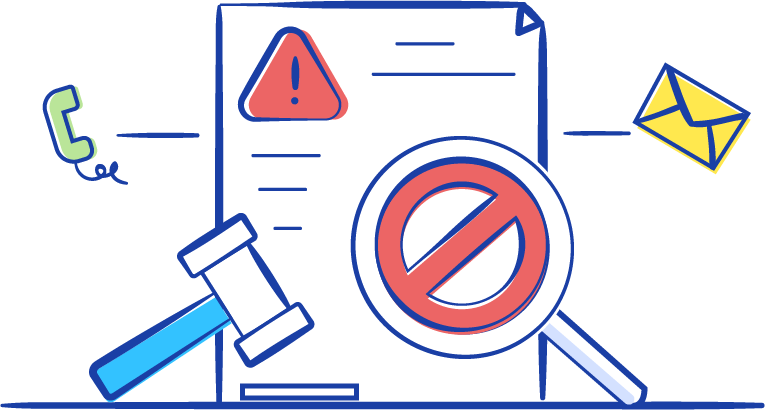
1. Non-centralized request management
From logging requests through emails and phone calls to storing critical documents and contracts across various devices, legal teams lack a central portal to track and manage their incoming requests and critical resources. Tracking legal requests with an effective service management platform gives your legal team visibility over all your legal requests and streamlines service delivery while also maintaining a central repository of all legal requests, including details on who handled them.
2. Slow process flow and inefficient workflows
With multiple requests to review, redline, and sign, managing them using a legacy tool or mailboxes can be impossible and increases the chance of missing important legal documents. A lack of clarity regarding how different requests need to be handled leads to avoidable delays and ineffective usage of resources, and costs the company money. Using simple workflows and request forms, legal teams can bring playbooks to life and ensure each legal request raised is handled properly, assigned to relevant legal counsel, and follows a defined set of steps to take each legal
request to completion.


3. Lack of governance and management of sensitive information
Legal documents contain important and sensitive information that serves as the basis of all partnerships that a company builds, and as such this information is privileged. Legal teams need to ensure that only the relevant people have access to this information and that legal documents are not modified without authorized permission and proper documentation. This can be curtailed by defining roles for the legal team members, and by providing appropriate view and edit access to critical legal resources.
4. Rolling out and managing large-scale
legal policy changes
Legal policies constantly need to be updated to be relevant with the changing business environment. Important policies like updated data laws or labor laws rolled out by governments need to complied with to continue business operations. Under such circumstances, legal teams need to update policy drafts and ensure key stakeholders, departments, and business verticals are well aware of the changes. Legacy systems are under-equipped to handle such large-scale changes effectively and put your company at risk of dishonoring policies. A streamlined change enablement process can help legal teams plan and roll out policy changes with a clear picture of the tasks that need to be done, and delegate said tasks to appropriate teams.
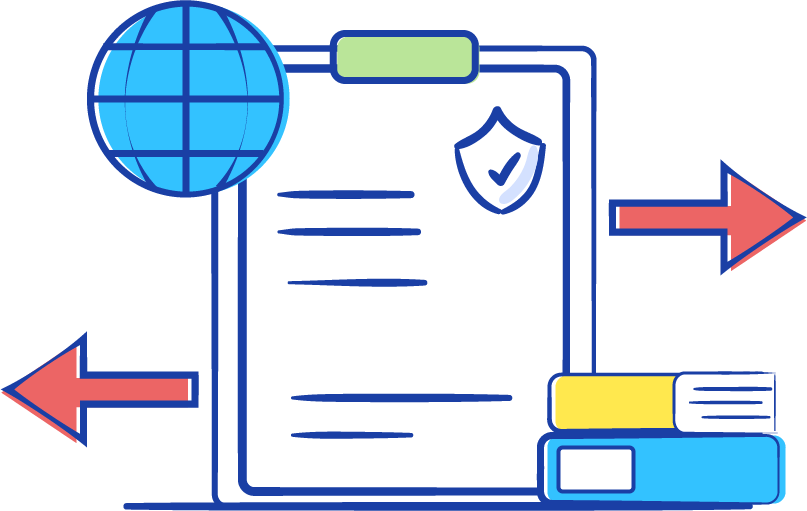

5. Poor visibility of key metrics
Without a centralized repository of legal requests and their records, it's impossible for legal teams to track performance and identify gaps in their current service delivery models. Legal teams are left searching manually through numerous mailboxes and emails to track key metrics like service delivery time, failure to deliver services, and number of revisions to measure performance.
Tracking and measuring key metrics is vital to streamline and optimize workflows to accelerate the delivery of legal services and effectively support business functions that require these documents.
What can you do with ServiceDesk Plus?
Record all your legal requests and contracts in a central location
Maintain a single source of truth for all your legal service requests, documents, and contracts.
Build powerful process workflows to streamline legal request fulfillment
Establish standard operating procedures to accelerate and standardize legal service delivery.
Manage who has access to your legal documents and data
Control access to your legal services and documents to protect sensitive data.
Roll out company-wide policy updates with minimum disruptions
Plan, manage, and roll out large-scale policy changes with a streamlined change enablement process.
Track your legal desk metrics in one place
Gain insight into the performance of your legal service desk with reports and dashboards.
How can you do it with ServiceDesk Plus?
Adopt a unified, structured service management culture to overhaul legal service delivery
- Give your users easy access to all legal services and knowledge base articles in a centralized location.
- Attach documents to requests to effectively manage reiterations and take legal documents to completion.
- Record all your legal requests in a central location with easy access to them at anytime, ensuring they are not lost due to negligence. This also moves document requests from personal mailboxes to a central location that is accessible by your entire legal team.
- Track and manage all your business, vendor, and customer contracts in one place with notifications that alert the legal service desk when contracts near expiry.
- Give back time to your lawyers by automating trivial tasks like request assignment, notifying key stakeholders, and handling L1 tickets by shifting them to Zia, our virtual AI assistant.
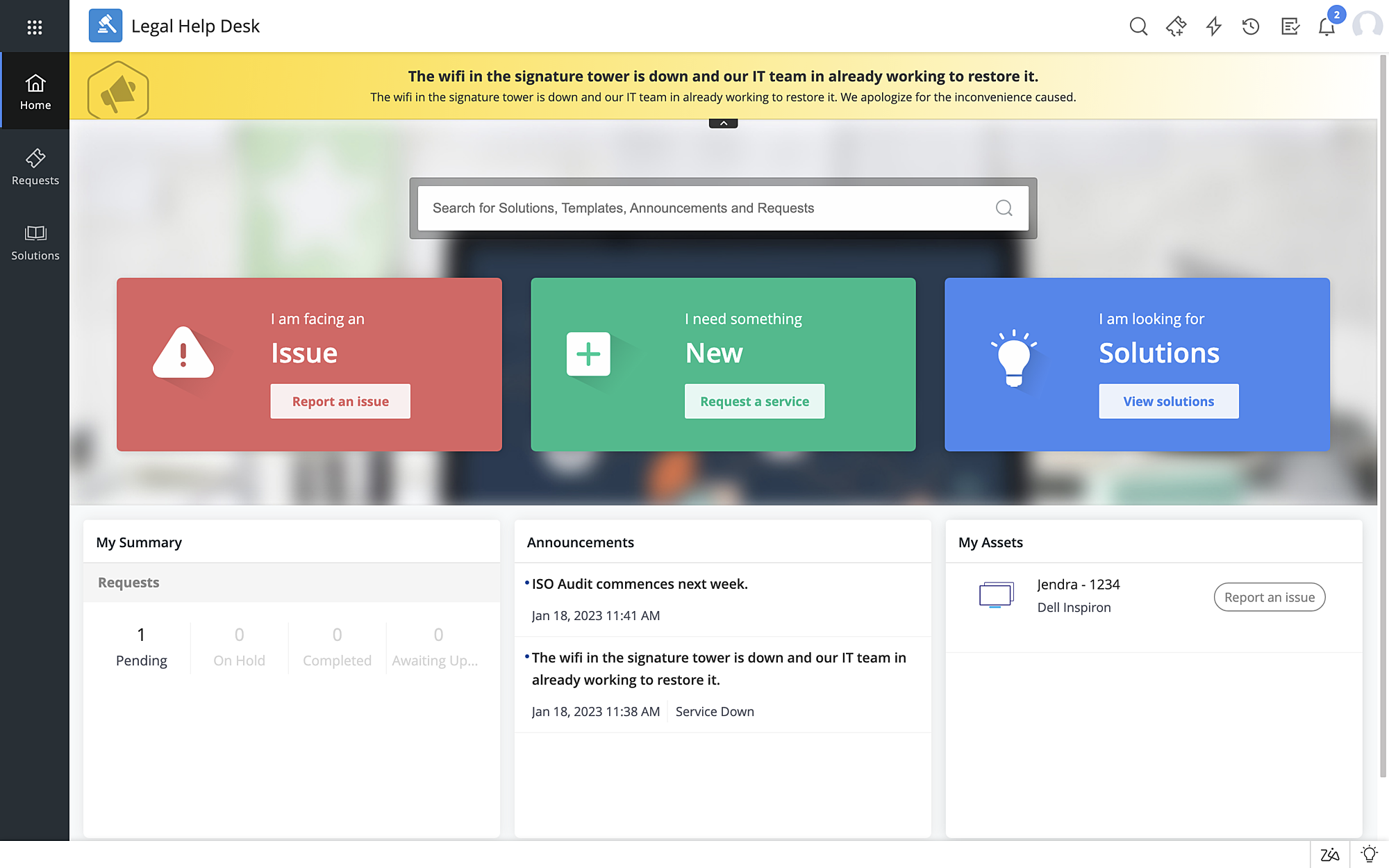
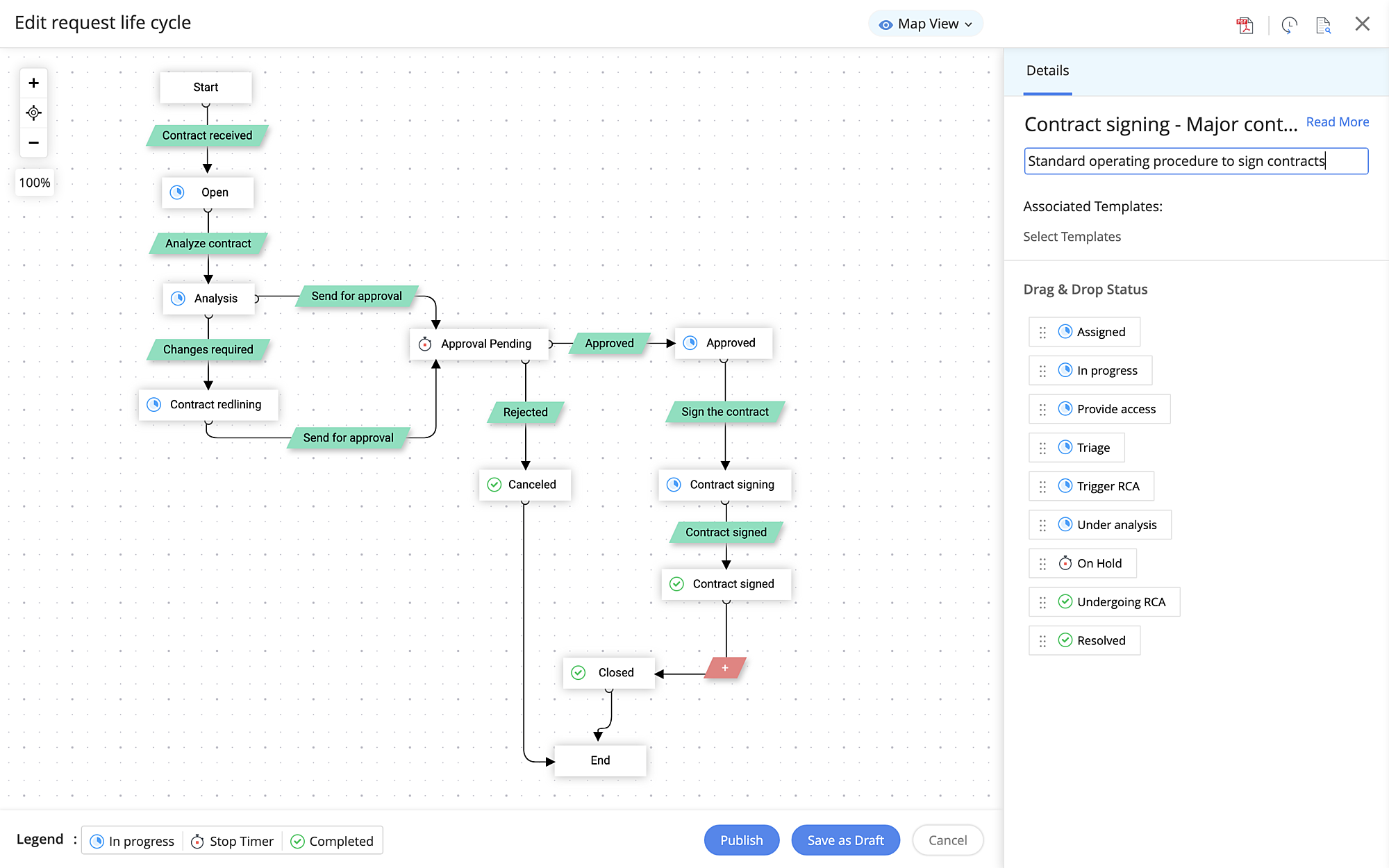
Leverage powerful end-to-end workflows to standardize legal service delivery
- Establish standard operating procedures for different kinds of legal requests by building end-to-end request life cycles on a visual canvas with a simple drag-and-drop actions.
- Bring your playbooks to life with unique workflows that guide your lawyers with actionable buttons that are available in the ticket based on various request parameters when configurable conditions are met.
Tailor-fit your legal service desk to your specific business needs with last-mile customizations
- Create custom categories, sub-categories, and items to segregate your legal requests, and use these parameters to route tickets to relevant lawyers or specialized legal groups.
- Collect relevant information about legal contracts and documents during request submission with dynamic custom templates powered by field and form rules.
- Create complex code-based customizations to perform a variety of automations that are unique to your business requirements in the integrated development environment in ServiceDesk Plus.
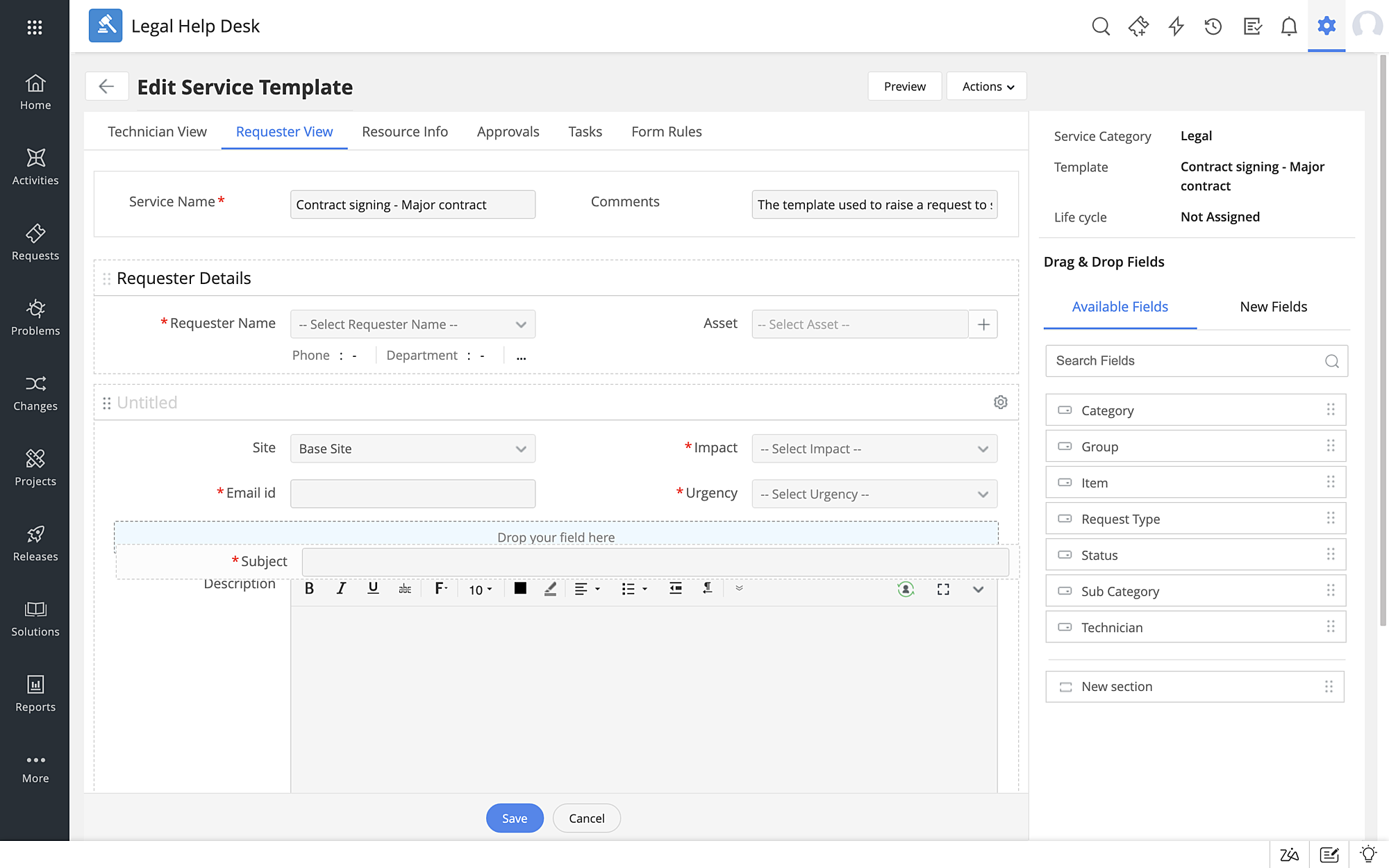
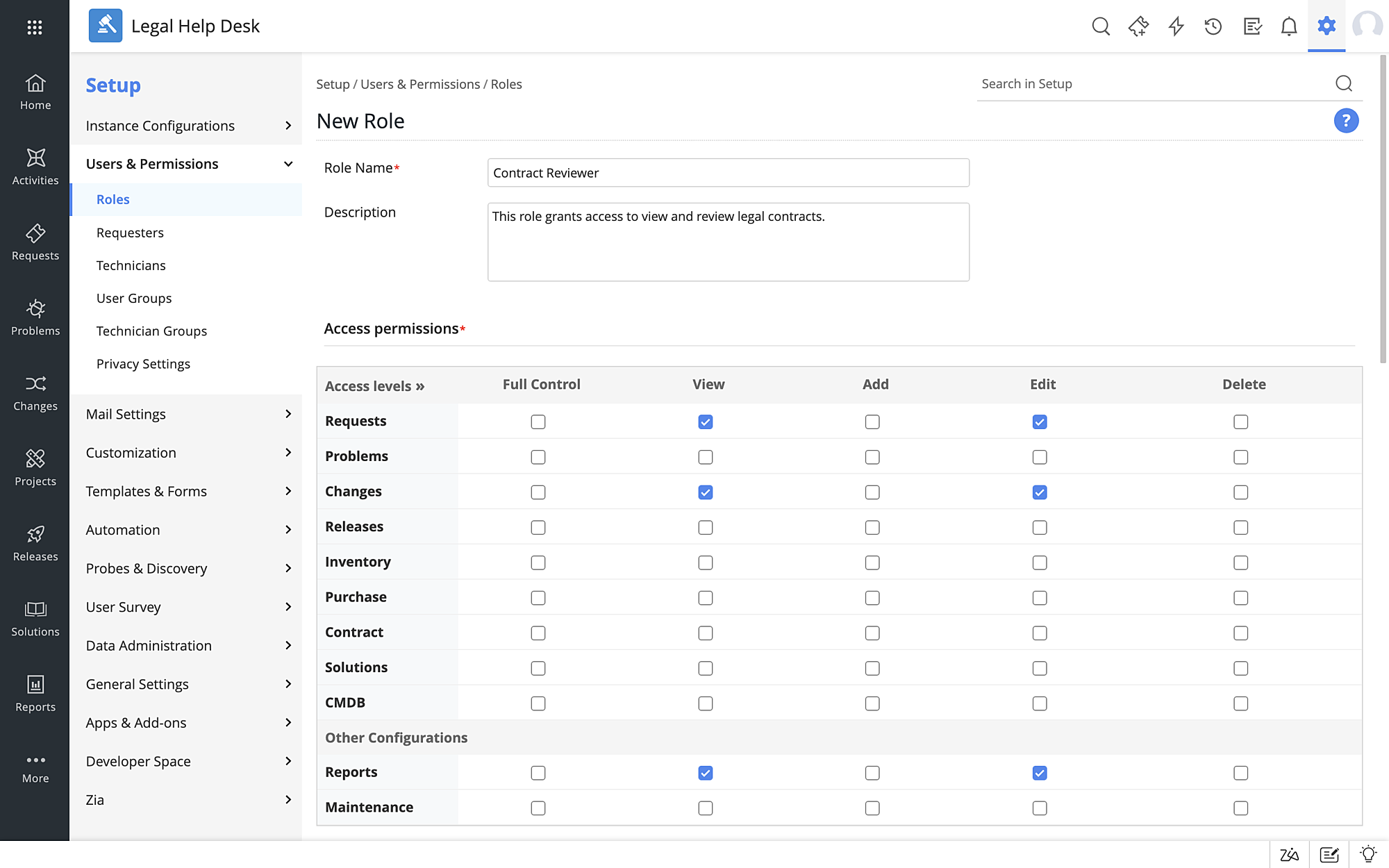
Establish control over sensitive information with good governance
- Improve governance of the legal service desk by providing access to users or user groups on an as-needed basis. This ensures that unauthorized users do not have access to your legal service desk portal and its resources.
- Manage user privilege with roles that define the level of access each member of the legal team has across your legal service desk.
- Track all the actions that have been performed on each of your legal tickets for better accountability, and identify point of modification right within the ticket.
- Protect the personal identifiable information of your customers, vendors, and employees with encrypted template fields that ensure data does not fall into the wrong hands.
Overhaul company-wide legal policy changes with a structured change enablement practice
- Leverage an eight-stage change enablement process with configurable change types, roles, statuses, and templates to manage large-scale policy changes better.
- Create impact, rollout, and backout plans and implementation checklists. Delegate tasks to relevant teams, and track the progress of the implementation from within the change ticket.
- Build custom change workflows to automate various operations like approvals or notifications, and establish standard operating procedures for legal policy changes.
- Configure custom change advisory boards with key stakeholders to ensure the right approvals are received before important changes move forward.
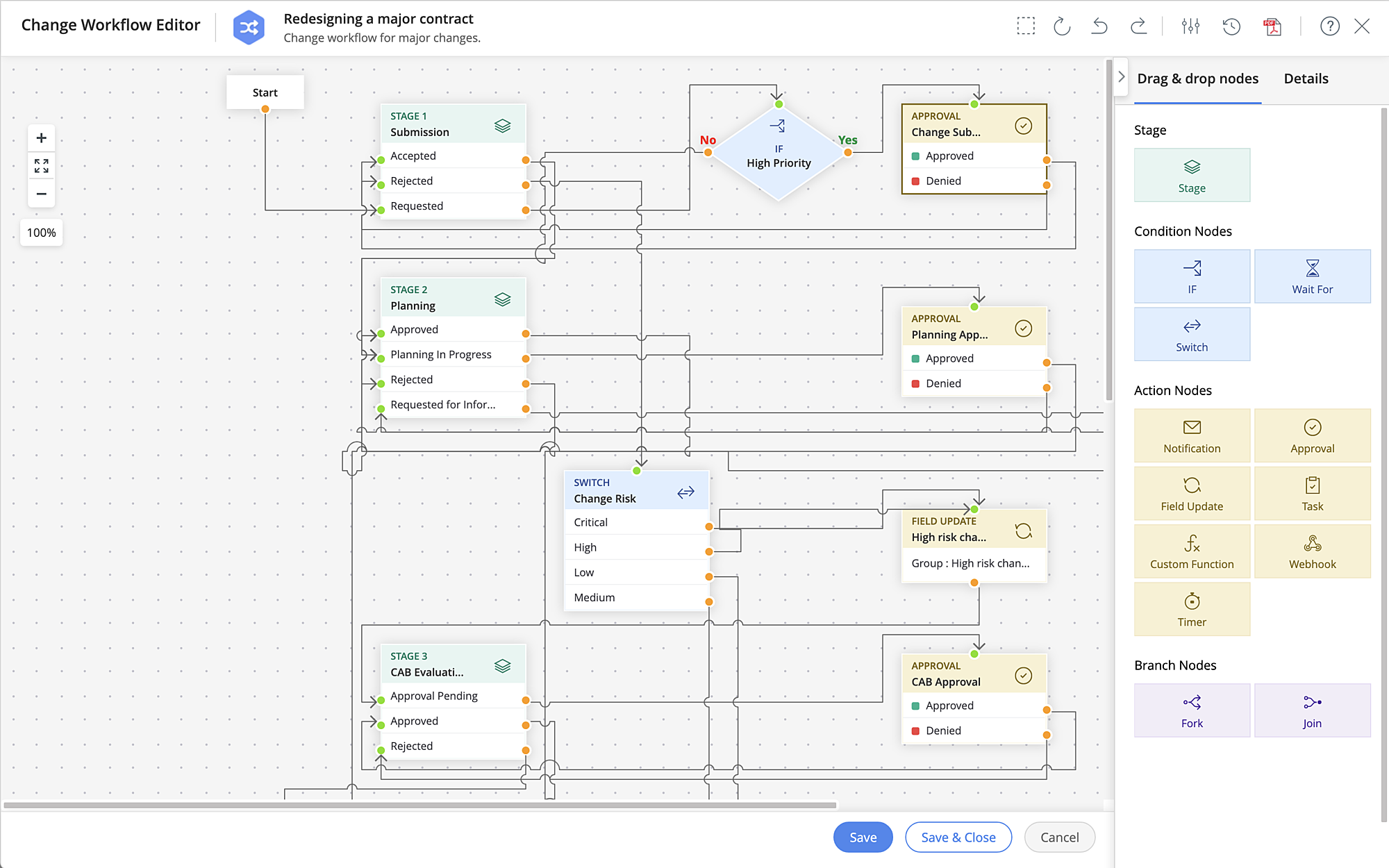
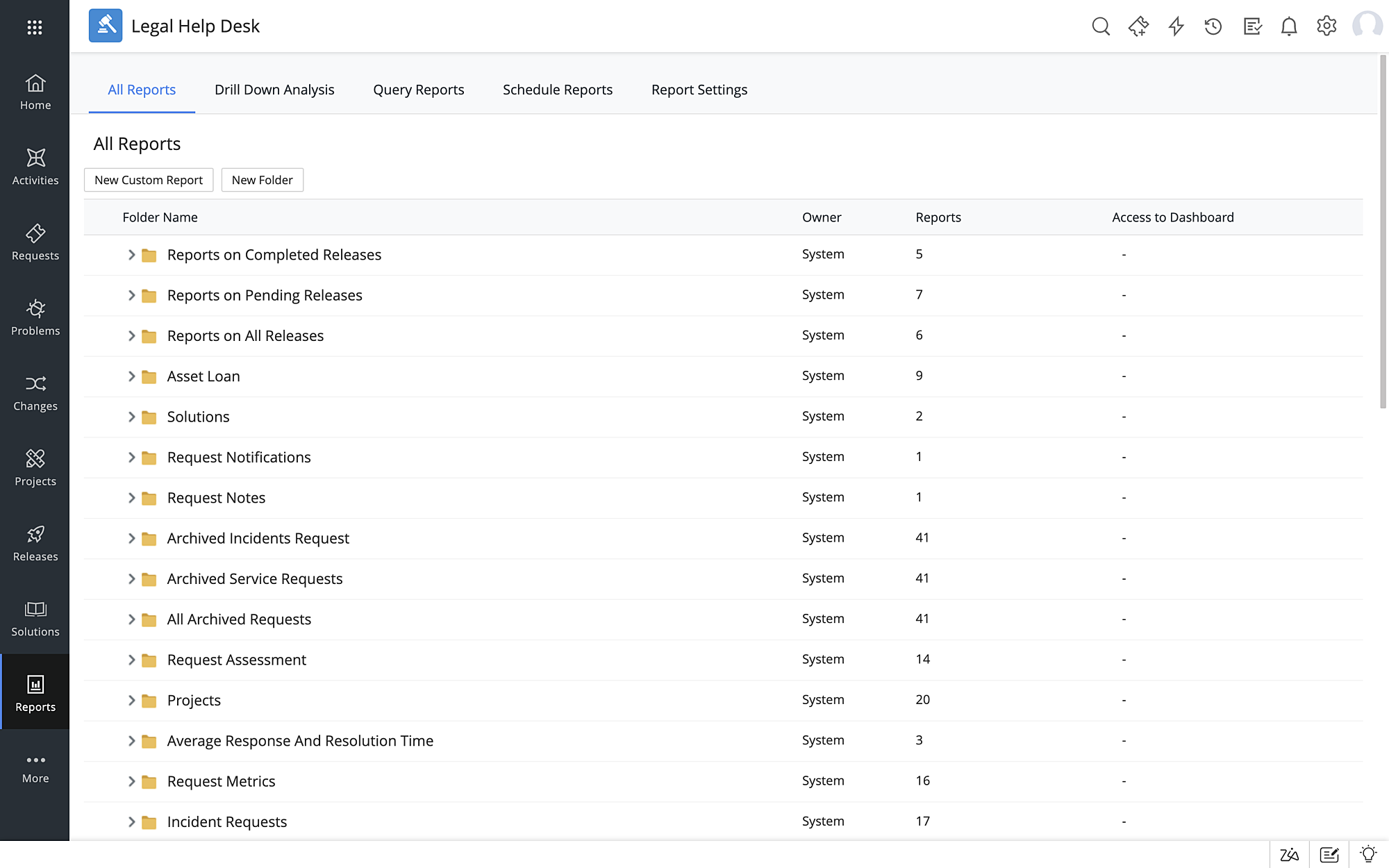
Understand the performance of your legal service desk with comprehensive reports
- Leverage ServiceDesk Plus' powerful reporting module, which comes with out-of-the-box reports, shows key metrics, and also includes an intuitive custom report building wizard that helps your legal team collect specific metrics.
- Build custom visual dashboards to help your supervisors get important information at a glance and track performance figures in real time.
- Schedule reports that are automatically sent to key stakeholders to track the performance of the legal service desk periodically.
Our commitment to privacy and security
Zoho Corporation is certified with ISO 27001 (Information Security Management System), ISO 27017 (Security Controls for Cloud Services), and ISO 27018 (Protection of Personally Identifiable Information), and is compliant with SOC 2 Type II (Security, Confidentiality, Processing Integrity, Availability, and Privacy).
The data of our SaaS application users resides in our data centers, which are also compliant with SOC 1 Type II and SOC 2 Type II as well as certified with ISO 27001 (Information Security Management System) and ISO 22301 (Business Continuity Management System).
Both the cloud and on-premises versions of ServiceDesk Plus are HIPAA compliant as a Business Associate. Zoho, the parent company of ManageEngine, serves the clients who are in compliance with HIPAA. The responsibility of Zoho is that of a "Business Associate" as defined in HIPAA.
